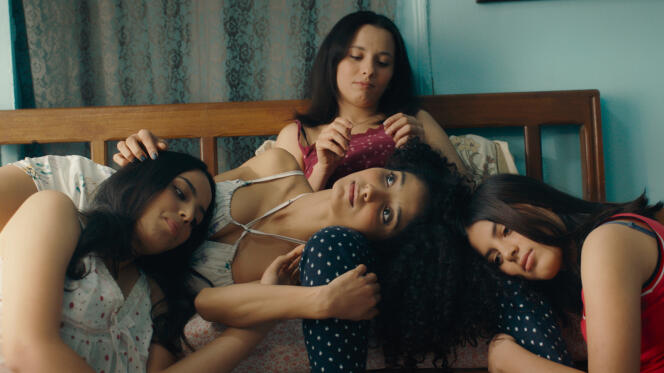Cannes 2023: “Les Filles d’Olfa”, six women on the set to tell a terrible family tear


Official selection – competition
Most likely, the new film of the Tunisian director Kauter Ben Hania – namely the author Tunisian chalat (2014) and The man who sold his skin (2020) – Must be listed as the second documentary entry in the competition, then youth (spring)by Van Bing. In fact, the matter is more complex, more hybrid. More precisely, it can be said that this film, which combines reality and reconstruction, amateurs and professionals, was born from the impossibility of filming a documentary.
Posing here as a preliminary to the story that we only slowly discover in the film, the filmed family suffered a terrible tear. Olfa, the mother, had four daughters. Missing are two elders who joined the Islamic State group in Libya and tried to recruit two younger ones there before the movement’s defeat landed the sisters, one of whom became a mother, in prison, where they remain.
Having identified the failure of Olfa’s first attempt to capture this horrific story in a classic documentary, Kauter Ben Hania changes perspective. He develops some strange device, tricks the family into believing that the story will turn out to be fiction, hires three actors – one to play the role of the mother’s double, the other two, the missing sisters – to confront their three documentary characters and make a film. the whole thing. Or six women on set, in a stylized camera that resembles a laboratory experiment. A great favor to him. Between the repeated scenes and the constant dialogue between these six women, the speech is free, the heart is full, the emotions are swirling.
An intimate and collective story
A story is also told, both intimate and collective. This, in particular, is Olfa, a monstrous woman, a victim of violence and its distribution to her children, a woman more masculine and stronger than men, who raised her daughters with the fear of their sexual emancipation and hatred of the male gender (interpretation of the film by the same actor).
Thus, the journey and tragedy of the two elders is gradually revealed, their absence becoming a sacred symptom rooted in the general story of the complete alienation of women in an ultra-patriarchal society and the specific response that Olfa, the victim, will give. Reproducing a sign of male dominance over herself and her daughters.
Source: Le Monde
Leave a Reply